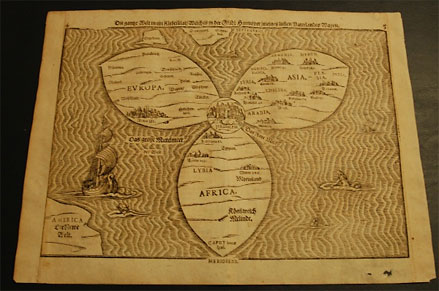Apr
24
2009
“The earth shall soon dissolve like snow,
The sun forbear to shine;
But God, who call’d me here below,
Will be forever mine.”
This verse in John Newton’s otherwise wonderful Amazing Grace makes me cringe. Bible symbolism is incredibly diverse, but also incredibly consistent, as a word search for flood or snow will show.
A flood is the rising of the Abyss in judgment, and after the historical flood, it was used by the prophets to picture Gentile nations flooding in from the ‘outer courts’ boundary over the four-cornered ‘Altar’ of Israel to wipe out the unfaithful ‘sons of God.’ It is used to picture Egypt, Babylon, and even the false teachings of the Judaisers in Revelation 12, but never mercy.
Snow only gets one negative rap, and that is the whiteness of ‘leprosy’ (actually, plague). In this case, it is the evil twin of true glory. It is death masquerading as life, an un-covering instead of a glorious robe.
“Woe to you, scribes and Pharisees, hypocrites! for you are like whited sepulchres, which indeed appear beautiful outward, but within are full of dead [men's] bones, and of all uncleanness.”
The symbols are important, and we are mostly illiterate concerning them. They are not poetic fluff in any way. God communicates truth by His word to interpret His creation. But we think like Greeks instead of Hebrews.
Comments Off | tags: John Newton, Typology | posted in Biblical Theology, Quotes
Apr
24
2009
“Since I was a little girl, friends, relatives and neighbours would bring their problems to Mother. She had a rare combination of being completely moral and completely nonjudgmental at the same time — the exact opposite of liberals who have absolutely no morals and yet are ferociously judgmental.
You could tell Mother anything, get good counsel and not end up feeling worse about yourself.”
–Ann Coulter
Comments Off | tags: Ann Coulter, Parenting | posted in Quotes
Apr
23
2009

“…Powers don’t enjoy being exposed as frauds, and so the Church, like Jesus, has often provoked vicious opposition. But the effort of the powers to shore up their position is hopeless. The worst they can do is kill Christians, but that just means the cross gets repeated over and over, repeatedly revealing the iron fist beneath the velvet glove. Against a cruciform Church, the powers are helpless as babes.
Continue reading
Comments Off | tags: Ecclesiology, Peter Leithart, Postmillennialism, Revolution | posted in Biblical Theology, Quotes
Apr
20
2009
High Chair Fundamentalism
The author of Hebrews wants to press on beyond basic Christian doctrine. He does not want to abandon this foundation, but he does want to build on it. That foundation is repentance from religion, faith in God, the meaning of the Levitical washings or baptisms in the Law, the laying on of hands, the resurrection, and eternal judgment. He is not content with his readers remaining in an infantile state–he intends to press on.
This is important because remaining in the foundational doctrines without pressing on creates the temptation toward apostasy. Those who have been initiated, who have tasted, but who do not press on to know Christ further are in grave danger. Sticking with the basics only is therefore not a good way to stick to the basics.
This is the central problem with pietistic fundamentalism; at the end of the day it is counterproductive and does not defend the things it seeks to defend. The real way to “defend” a foundation is by building on it.
–Doug Wilson, Christ and His Rivals, p. 111
Comments Off | tags: Doug Wilson, Hebrews, Maturity, Teaching | posted in Christian Life, Quotes
Apr
17
2009
“Cheap grace is the preaching of forgiveness without requiring repentance, baptism without church discipline, Communion without confession… Cheap grace is grace without discipleship, grace without the cross, grace without Jesus Christ, living and incarnate… Above all, it is grace because God did not reckon his Son too dear a price to pay for our life, but delivered him up for us. Costly grace is the Incarnation of God.”
–Dietrich Bonhoeffer
5 comments | tags: Bonhoeffer, Grace | posted in Quotes
Apr
16
2009
What about the Grammatical Historical Method?
“I affirm and use the grammatical historical method in all my study of Scriptures, but I do not think it is the only method to use in our study or sermon preparation. If the Bible is one history with many sub-histories, then the grammatical historical method focuses too much on the subs and little on the one history. It draws our attention to the locus without seeing the larger picture. It focuses on the tree while missing the forest. Typology, on the other hand, working with GHM, gives validity to the Biblical language and the Biblical worldview.”
Uri Brito, http://apologus.wordpress.com
Comments Off | tags: Hermeneutics, Typology, Uri Brito | posted in Quotes
Apr
16
2009
Always a Good Investment
Our nation is in the midst of significant financial upheaval, along with many other nations, and because of this we have to remember certain things as we approach God with our worship. Lord willing, we will address this in greater detail in next week’s message, but it is important to say a few things about it now.
Continue reading
Comments Off | tags: Doug Wilson, Faith | posted in Christian Life, Ethics, Quotes
Apr
16
2009

[Jesus] was a master of ready speech and witty repartee, but most of the sayings that have come down to us bear every sign of careful preparation. They have the qualities of poetry, and with the aid of paradox, exaggerations, or play on words, were cast in such a shape as would enable them to find their way into the dullest mind and stay there.
Continue reading
Comments Off | tags: Sermon on the Mount | posted in Biblical Theology, Quotes
Apr
15
2009
(A post from my friend Matthew’s blog. I haven’t read this book.)

I recently read The Lost History of Christianity – The Thousand-Year Golden Age of the Church in the Middle East, Africa and Asia- and How It Died by Philip Jenkins (2008). It is a magisterial introduction to a rich but largely forgotten history. The lands Jenkins has in mind were well and truly the centre of the Christian world for well over a thousand years, even after the Muslim invasion of these lands from the seventh century.
Continue reading
Comments Off | tags: China, Church Growth, Church History | posted in Quotes
Apr
15
2009
“The kingdom of God is like a banquet filled up with blind and lame losers. We must replicate that in our lives, loving the unlovely. And the kingdom of God is also like a banquet where the servants drag out a guy in blue jeans so that he could be handed over to the torturers. Huh. The Lord’s Table is a come-one, come-all event. The Lord’s Table is place of fierce discipline. Absolutise either one, and trouble ensues.”
www.dougwils.com
Comments Off | tags: Communion, Doug Wilson | posted in Biblical Theology, Quotes




























